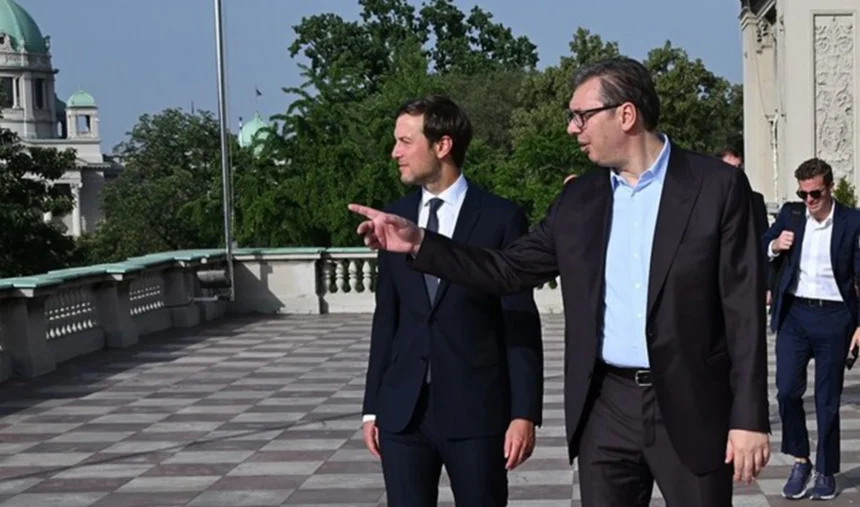A secret investment agreement between Serbia and Jared Kushner’s firm — the son-in-law of former U.S. President Donald Trump — reveals a deal that heavily favors the American partner, granting control of 77.5% of a joint company tasked with developing the former Yugoslav Army General Staff complex in central Belgrade.
Under the contract, Serbia will demolish the protected complex at its own expense, lease the land for free for 99 years, and even allow that lease to be converted into full ownership later.
If Serbia fails to meet its obligations by May 2026, Kushner’s company can terminate the contract unilaterally and claim millions of euros in damages, potentially up to €50 million.
A Controversial Partnership
The agreement, signed in May 2024 between Atlantic Incubation Partners LLC and the Government of Serbia, designates Kushner’s company as a “strategic partner” with 77.5% ownership, while Serbia retains only 22.5%.
The state also pledged to remove the heritage protection status from the General Staff complex “in a manner satisfactory to the investor,” demolish all structures, and hand over “environmentally clean” land for redevelopment.
In exchange, Serbia’s contribution amounts to €2,250 in the company’s initial capital of €10,000, with Kushner’s firm investing the rest.
The contract was approved by the Serbian government in February 2024 and signed by Goran Vesić, then-Minister of Construction, who is now under investigation by the Organized Crime Prosecutor’s Office over alleged financial misconduct.
Beograd on the Potomac: Three Towers and a Trump Hotel
The project envisions three towers, 135 meters tall, covering 280,000 square meters of floor space — of which 187,000 will be residential, 8,500 for a hotel, and only 3,000 for a museum, representing just 1% of the total complex.
According to renderings, one building — the former 7th Regiment Barracks, a protected cultural monument — is slated to become an “International Trump Hotel”, though this has not been publicly confirmed by any government official.
Legal and Political Fallout
The deal mirrors the controversial “Belgrade Waterfront” project, also tied to a UAE bilateral agreement that allowed state land to be transferred for free. Notably, the same bilateral treaty with the United Arab Emirates applies here — a clause allowing the contract to be transferred to an Emirati entity without Serbia’s consent.
The leaked contract also binds Serbia to confidentiality, forbidding any public statements without written approval from Kushner’s firm.
However, the agreement is already entangled in a criminal investigation.
The Director of Serbia’s Institute for the Protection of Cultural Monuments, Goran Vasić, admitted to forging the document that allowed the government to remove heritage protection from the General Staff complex. Two other senior officials, including a Ministry of Culture secretary, have also confessed to their roles.
Financial Risks and Hidden Guarantees
If Serbia fails to meet deadlines or violates the agreement, taxpayers could face damages between €1 million and €50 million. The state guaranteed Kushner’s firm that no lawsuits, claims, or investigations exist concerning the land — even though legal challenges are now unfolding.
Furthermore, the government pledged that neither Serbia nor its representatives are under any U.S. sanctions or have violated anti-corruption laws — guarantees that may now be tested.
Echoes of Savamala
Observers draw parallels with the 2016 Savamala demolitions, when buildings were destroyed overnight to clear land for the Belgrade Waterfront project. Critics fear the General Staff demolition could follow the same pattern — whether “under masks at night or in broad daylight,” as President Aleksandar Vučić once quipped.
For Kushner, the Belgrade project — valued at €500 million — may symbolize a geopolitical bridge to Washington.
For Serbia, however, it risks becoming an expensive gesture of goodwill toward Trump’s inner circle — one that could cost its taxpayers millions.







